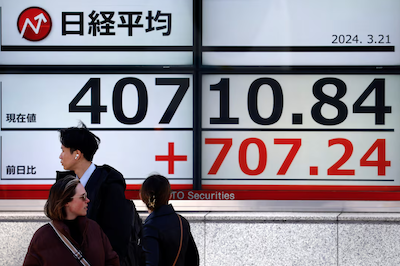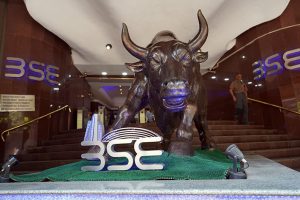Asia’s major stock indexes saw another mixed day of trading on Tuesday as investors continued to assess the possible impact of the assassination attempt on US presidential candidate Donald Trump.
US stocks ended higher on Monday as bets of a second Trump presidency raised hopes of a looser regulatory environment and that fed into some Asian markets, while a tech slump dragged elsewhere on fears of an escalation of the Sino-US trade war under a Trump presidency.
Japan’s Nikkei share average edged ahead, tracking gains in Wall Street, after its markets were closed on Monday for a public holiday.
Also on AF: OpenAI’s ‘Strawberry’ Model Would Be Capable of ‘Deep Research’
The Nikkei share average edged up 0.20%, or 84.40 points, to close at 41,275.08, while the broader Topix was ahead 0.34%, or 9.94 points, at 2,904.50.
Shares of defence-related Mitsubishi Heavy Industries and Kawasaki Heavy Industries jumped 5% and 6.2%, respectively, to become top gainers, as speculation of a Trump win spurred so-called “Trump trades”.
The market was also on the lookout for company earnings, with many participants expecting export firms to announce increased revenues amid stubborn yen weakness.
The yen has strengthened against the dollar since Thursday, with many suspecting Tokyo may have intervened to lift the currency away from 38-year lows.
China stocks held steady, as investors awaited the details of reform measures announced at the ‘Third Plenum’ meeting amid a slew of weak economic data. Hong Kong shares fell, dragged by tech stocks.
China’s economy grew much slower than expected in the second quarter as a protracted property downturn and job insecurity knocked the wind out of a fragile recovery, keeping alive expectations that Beijing will need to unleash more stimulus.
The Shanghai Composite Index rose 0.08%, or 2.29 points, to 2,976.30, while the Shenzhen Composite Index on China’s second exchange advanced 0.49%, or 7.80 points, to 1,611.80.
JD Vance Nomination
China’s blue-chip CSI300 index was up 0.63% with, earlier in the session, its financial sector sub-index down 0.54%, the consumer staples sector up 0.16%, the real estate index up 1.74% and the healthcare sub-index trading 0.17% higher.
Chinese H-shares listed in Hong Kong – stocks belonging to companies from the Chinese mainland – fell 1.34% to 6,335.88, while the Hang Seng Index lost 1.60%, or 287.96 points, to end at 17,727.98.
Hong Kong-listed tech giants declined 1.7% and shares of China’s Ping An Insurance fell 5.4%, after the insurer said it had raised $3.5 billion in a convertible bond.
Elsewhere across the region, in earlier trade, Sydney, Singapore, Wellington and Jakarta also fell, though Seoul, Mumbai, Taipei and Manila edged up.
MSCI’s broadest index of Asia-Pacific shares outside Japan fell 0.3%, extending Monday’s 0.3% decline.
Europe was set to open lower, with Eurostoxx 50 futures down 0.3%. S&P 500 futures gained 0.2% and Nasdaq futures firmed 0.3% after dovish Fed comments fuelled bets of more US rate cuts this year, lifting Wall Street.
Overnight, investors continued to digest the fallout from the shooting on Saturday of former US President Donald Trump, who nominated JD Vance on Monday as his vice-presidential running mate.
Dow Jones Record
Opinion polls show a close race between Trump and President Joe Biden, though Trump leads in several swing states that are likely to decide the election.
The Dow Jones hit a record closing high, thanks to energy and banking shares. Bitcoin jumped, gold climbed towards a record high and the yield curve steepened as investors favoured so called Trump-victory trades.
Meanwhile, Fed Chair Jerome Powell said on Monday the three US inflation readings over the second quarter do “add somewhat to confidence” that inflation is returning to the Fed’s target in a sustainable fashion.
Markets have now fully priced in a quarter-point rate cut from the Fed in September, with a total easing of 68 basis points (bps) expected by the end of the year.
That kept a lid on the US dollar overnight, although it was 0.1% firmer on Tuesday against a basket of major currencies, thanks to the renewed yen weakness.
Long-term Treasuries found their footing in Asia, with the 10-year yield off 2 bps at 4.2060%, having risen 4 bps overnight.
Gold rose 0.3% to $2,428.67 an ounce, nearing a record high, while oil prices ticked down on worries that slowing Chinese economy would crimp demand.
Key figures
Tokyo – Nikkei 225 > UP 0.20% at 41,275.08 (close)
Hong Kong – Hang Seng Index < DOWN 1.60% at 17,727.98 (close)
Shanghai – Composite > UP 0.08% at 2,976.30 (close)
London – FTSE 100 < DOWN 0.43% at 8,148.16 (0935 BST)
New York – Dow > UP 0.53% at 40,211.72 (Monday close)
- Reuters with additional editing by Sean O’Meara
Read more:
Thai Economy Rocked by Factory Closures, Cheap Chinese Imports
Hang Seng Dips on Trump Fears, Stimulus Bets Lift China Stocks
China’s New Home Prices Fall at Fastest Pace Since 2015
China’s Growth Slows in 2nd Quarter, Downturn Hits Retail Sales
Conflicting Goals Could Limit Outcomes From China’s Plenum























